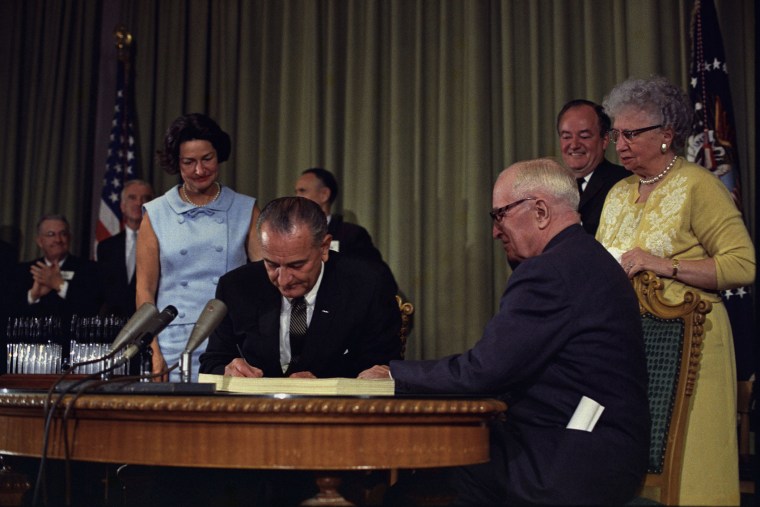Republican presidential hopeful Jeb Bush is eager to "phase out" Medicare and replace the system altogether. The Paul Ryan budget plan, widely embraced by GOP officials, would have scrapped Medicare and replaced it with a voucher system. Marco Rubio, another national 2016 candidate, is also fighting to eliminate Medicare -- social-insurance programs like these, he's said, have "actually weakened us as a people."
Exactly 50 years ago today, President Lyndon Johnson signed Medicare into law, and the Republican attacks against the system have been pretty consistent ever since -- as the 2016 race shows. But looking at the bigger picture, the Huffington Post's Jonathan Cohn had a great piece today on the half-century of progress, despite the partisan conflicts.
[I]f some seniors still struggle with medical bills, the situation is far better than it was five decades ago, when half of the elderly population had no insurance at all. Studies have shown that Medicare has meant substantially smaller out-of-pocket spending for seniors and maybe (though not certainly) longer lives. The financial protection that the program provides to beneficiaries helps explain why just one in 10 seniors now lives in poverty. That's roughly a third of what it was in the mid-1960s.
I'm often fascinated with how profoundly wrong Republicans have been in their predictions about the Affordable Care Act -- pretty much every possible forecast the GOP made turned out to the opposite of what happened -- but conservative predictions about Medicare, before and after its passage, are arguably even more striking.
Take Ronald Reagan, for example.
In 1961, soon after JFK made Medicare a priority, Reagan used his status as a Hollywood celebrity to do a recording for the American Medical Association, warning Americans to reject the idea. But as long-time readers may recall, the important thing is how far off the mark Reagan was.
Reagan argued at the time that if Medicare became law, we'd see federal officials empowered to dictate where physicians could practice medicine, and open the door to government control over where Americans were allowed to live. In fact, Reagan warned that if Medicare passed, there was a real possibility that the federal government would control what Americans could do for a living.
Reagan added, "Freedom is never more than one generation away from extinction. We didn't pass it on to our children in the bloodstream. The only way they can inherit the freedom we have known is if we fight for it, protect it, defend it and then hand it to them with the well-taught lessons of how they in their lifetime must do the same. And if you and I don't do this, then you and I may well spend our sunset years telling our children and our children's children what it once was like in America when men were free."
I'm pleased to report that the Medicare-induced apocalypse that Reagan envisioned never arrived, and that dystopian nightmare looks pretty silly in hindsight. In fact, Medicare has become a wildly popular and effective program, which most of the country considers a bedrock pillar of modern American life.
But Reagan-esque arguments never really went away. Americans may like the system, but for the right, it's still socialized insurance, which must be resisted and rejected for ideological reasons. With Medicare facing long-term fiscal challenges, Republicans are even more desperate to reach their destination: the complete privatization of Medicare.
Whether Medicare enjoys another 50 years will depend entirely on whether those GOP efforts are successful.
